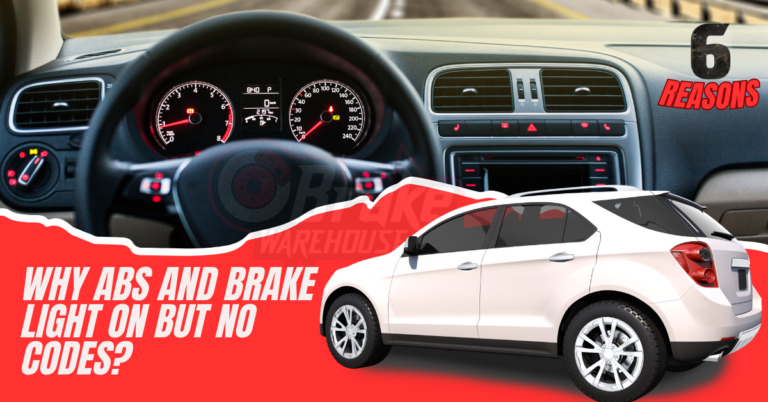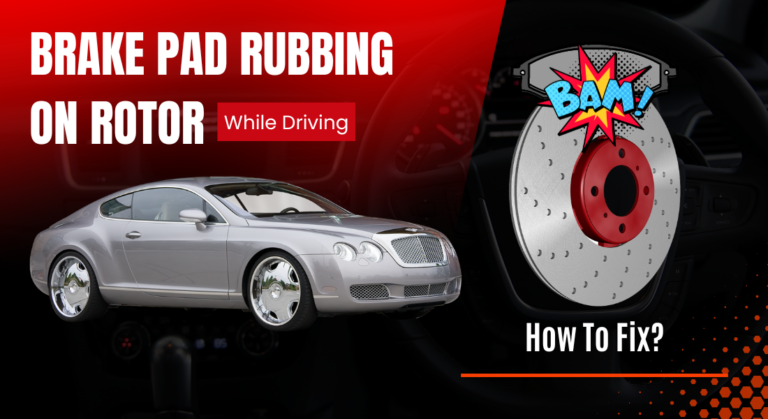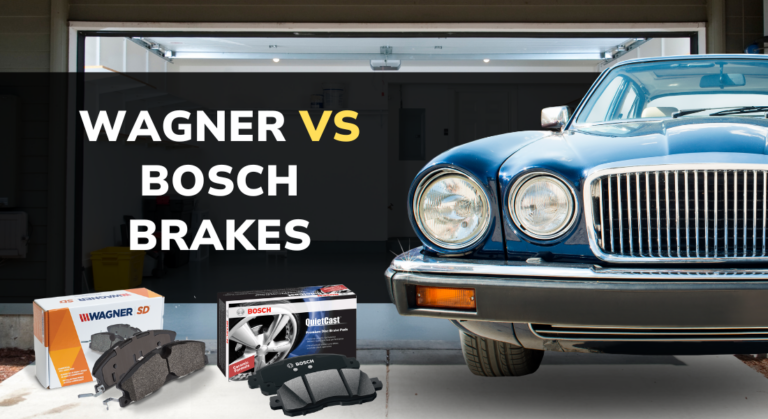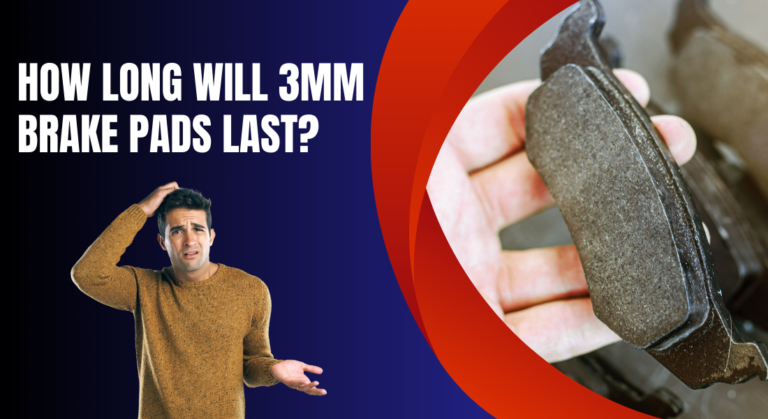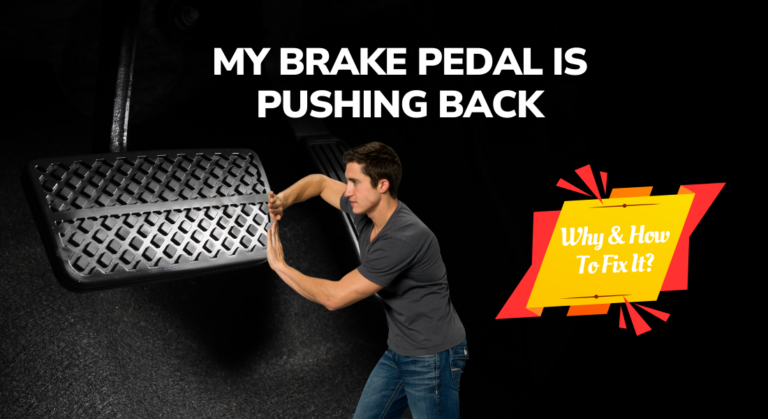What Causes Brake Pedal Sticking? (Fix Now)
The brake pedal plays a crucial role in a vehicle’s braking system, enabling the driver to slow down or bring the vehicle to a halt. However, there are instances when drivers encounter a stick brake pedal, which can pose challenges when applying pressure.
Common reasons include a malfunctioning brake booster, corroded or worn-out brake components, improper brake fluid, or brake pedal linkage issues, which can lead to difficulties in smoothly depressing the brake pedal and affect overall braking performance.
Read and learn what causes brake pedal sticking and solutions to rectify the issue.

What Causes Brake Pedal Sticking?
Various factors can cause brake pedal sticking. Here are the potential causes.
Low Brake Fluid Level

A common cause of a sticky brake pedal is a low brake fluid level. Brake fluid is crucial for transmitting force from the brake pedal to the brake calipers. The fluid applies pressure to the brake pads and slows down the vehicle.
If the fluid level is low, there won’t be enough hydraulic pressure, leading to a sticky pedal. Check the fluid level, top it up if it is low, and investigate potential brake system leaks.
Air in the Brake Lines

Air in the brake lines is another culprit behind a sticky brake pedal. When air accumulates in the lines.
It hinders smooth brake fluid flow, causing a loss of hydraulic pressure and a sticky pedal. Bleeding the brakes is the solution to expel air, restoring hydraulic pressure.
Read Also: Air In Brake Lines Will Cause What Type Of Problems?
Failed Brake Booster

A malfunctioning brake booster can contribute to a sticky brake pedal. The brake booster amplifies the force applied to the pedal, making braking easier. If the booster fails, it can’t amplify the pedal’s force, causing a sticky feel.
To check, turn off the engine and pump the brake pedal. The booster might be the issue if it softens after a few pumps.
Read Also: Not Enough Vacuum for Brake Booster – How To Fix It?
Worn Brake Pads or Rotors

Worn brake pads or rotors can reduce hydraulic pressure, leading to a sticky pedal. When these components wear out, the braking system can’t function correctly.
To resolve this, replace the worn brake pads and rotors to restore proper hydraulic pressure.
Read Also: How Long Will 3mm Brake Pads Last? (The Ideal Thickness)
Frozen Brake Calipers

Frozen brake calipers are another potential cause of a sticky pedal. Brake calipers apply pressure to the brake pads, then contact the brake rotors to slow the vehicle.
If the calipers freeze, they can’t apply pressure, resulting in a sticky pedal. Moisture in the brake system is a common cause of frozen calipers. Consult a certified mechanic for diagnosis and repair.
Read Also: Both Front Brake Calipers Not Releasing – Why & How To Fix?
Faulty Brake Master Cylinder

A defective brake master cylinder can also lead to a sticky pedal. This component converts pedal force into hydraulic pressure for the calipers. A faulty master cylinder may struggle to generate sufficient hydraulic pressure, resulting in a sticky pedal.
Test it by starting the engine and pumping the brake pedal; if it remains sticky, the master cylinder may be the issue.
Contaminated Brake Fluid
Brake fluid absorbs moisture from the environment over time, leading to corrosion and decreased hydraulic pressure. Contaminants like debris or dirt can clog brake lines, causing a sticky pedal.
Replace the brake fluid every two years or per the manufacturer’s recommendation to prevent contamination.
Malfunctioning ABS System

A malfunctioning Anti-lock Braking System (ABS) can cause a sticky pedal. ABS prevents wheel lock during emergency braking. It can reduce hydraulic pressure if it malfunctions, resulting in a sticky pedal.
An illuminated ABS warning light indicates a problem requiring a certified mechanic’s diagnosis and repair.
Damaged Brake Hoses

Damaged brake hoses can lead to a sticky brake pedal. These hoses transmit hydraulic pressure from the brake lines to the calipers.
If damaged or deteriorated, they may collapse, preventing proper pressure transmission and causing a sticky pedal. Consult a certified mechanic for diagnosis and repair if you suspect damaged brake hoses.
Worn Out Brake Shoes

Worn-out brake shoes can cause a sticky pedal in vehicles with drum brake systems. Brake shoes press against the drums to slow the vehicle. They can’t engage the drums properly if they’re worn out, leading to a sticky pedal.
Have a certified mechanic assess and replace worn-out brake shoes as necessary.
Faulty Brake Proportioning Valve

A faulty brake proportioning valve can result in uneven brake pressure distribution between the front and rear, causing a sticky pedal.
Regular inspection and maintenance by a certified mechanic can help prevent issues with this valve.
Brake Fade

Brake fade occurs when brakes overheat and lose effectiveness, resulting in a sticky pedal. Avoid harsh braking and allow brakes to cool down between prolonged use to prevent brake fade.
Worn Out Brake Drums

Worn-out brake drums can lead to a sticky pedal in drum brake systems. Brake drums generate friction between the brake shoes and the drum to slow the vehicle. They may not provide sufficient friction if worn out, resulting in a sticky pedal.
Regular inspection and maintenance by a certified mechanic can help prevent worn-out brake drums.
How to Diagnose a Stiff Brake Pedal?
If your brake pedal is becoming increasingly stiff, it may indicate a problem within your brake system. To diagnose and resolve the issue, follow these steps to identify the cause of the stiffness and restore your brakes to optimal condition.
Begin by checking the brake fluid level. Low fluid levels can lead to a stiff brake pedal. Add more fluid to bring it back to the recommended level if necessary.
Next, inspect the brake lines for any signs of air. The presence of bubbles or foam in the fluid suggests air has entered the system, potentially causing a stiff pedal.
If needed, bleed the system to remove excess air.
Now, examine all components of your braking system for damage or wear that might be contributing to the stiff pedal:
- Inspect your brake pads for wear and replace them if necessary.
- Check the master cylinder for any damage and replace it if needed.
- Examine the brake booster for signs of damage, replacing it if necessary.
- Inspect the caliper for leaks or damage and replace it as required.
- Lastly, check the brake pedal for any signs of wear or corrosion and replace it if needed.
Once you’ve thoroughly examined and replaced any components as required, you should notice an improvement in your brake system’s performance.
FAQs
What are the common signs and symptoms of a sticking brake pedal?
Common signs of a sticking brake pedal include difficulty in smoothly releasing the pedal after applying brakes, the pedal’s feeling depressed or requiring extra effort to return to its resting position, and potential vehicle pull to one side during braking due to uneven brake engagement.
Can worn brake pads or rotors be a factor in a sticking brake pedal?
Yes, worn brake pads or rotors can contribute to a sticking brake pedal. As brake pads wear down, they may not retract fully from the rotors, leading to prolonged contact and a sensation of pedal sticking. Additionally, uneven rotor wear can exacerbate this issue, causing irregular braking performance.
Are there safety risks associated with a brake pedal that sticks intermittently?
There are significant safety risks linked to an intermittently sticking brake pedal. It can lead to unpredictable braking behavior, potentially causing accidents or collisions. Drivers may struggle to control the vehicle’s speed or direction during sudden braking, posing a serious hazard to themselves and others on the road.
Wrapping Up
By now you already know what causes brake pedal sticking. Your safety and that of your passengers hinge on the proper functioning of your braking system.
If you detect any problems in your vehicle’s brake system that could result in a stick brake pedal and lock-up, it is imperative to schedule a vehicle inspection to prevent any potential accidents.

Meet Zayan, the mechanical genius behind the highly acclaimed brakes problems and solutions website. With over a decade of hands-on experience in the automotive industry, Zayan has become a trusted authority in the realm of brake systems.
His passion for cars, coupled with his expertise in solving complex brake-related issues, has earned him a devoted following of car enthusiasts, mechanics, and everyday drivers seeking reliable guidance.

